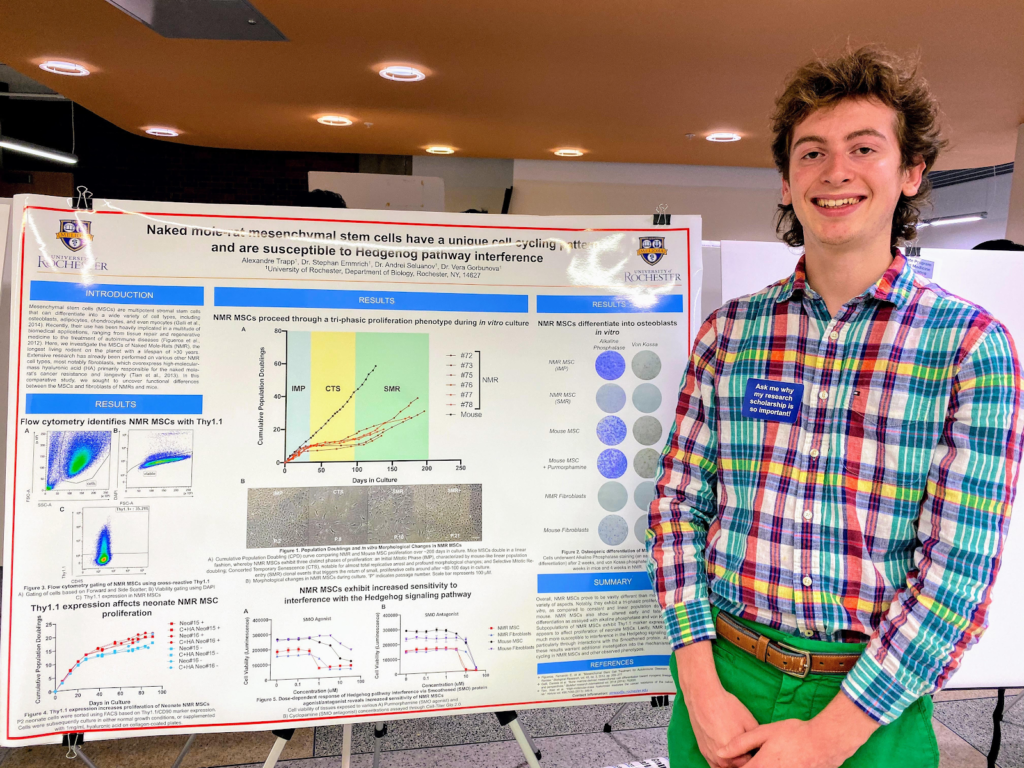What do degus, cancer cells, aging, and genomics have in common? Alex Trapp works with all of them.
Trapp is a senior exploring the world of data crunching and genetic processes through his biological research with professors Andrei Seluanov and Vera Gorbunova.
“I’ve always wanted to be a doctor,” Trapp said, “but I didn’t really know what that meant.” After joining the Gorbunova and Seluanov Laboratory his junior year, Trapp discovered his interest in scientific research. It was initially tough for Trapp, a newcomer who had yet to gain independence in the lab. As an undergraduate with no previous research experience, Trapp had not yet worked with laboratory techniques beyond course required labs. However, after several months of technique development — he had uncovered his passion for scientific inquiry. “After a few months, I realized I wanted a Ph.D. and I wanted to be in the biotech world. I knew that was the way to go.”
Trapp conducts his research on aging by exploring mesenchymal stem cells — special cells found within the lining of bone marrow, that can differentiate into a variety of cell types including make up bones, cartilage, fat, and muscle — and how they differ in rodents versus humans. “I’m [very] much into understanding healthspan, rather than lifespan,” Trapp said. As a 2019 de Kiewet Fellow, Trapp spent this past summer in Rochester studying these cells.
Trapp said the researchers focus on mesenchymal stem cells in the naked mole rat compared to mice, degus (another rodent), and humans.
Naked mole rat skin cells, called fibroblasts, contain a distinct molecule called hyaluronic acid. In 2013, the Gorbunova and Seluanov Laboratory found that naked mole rats produce larger quantities of hyaluronic acid than humans. Naked mole rats can live for over 30 years, while similarly-sized mice have a lifespan of approximately two years.
In collaboration with a postdoctoral associate, Trapp is studying the tumor-fighting mechanisms that appear to help naked mole rats live a healthier, longer life.
“We are interested in seeing how to transform these cells by creating and applying different viruses and plasmids that we create,” he said. This type of experimentation and methodology can provide important insights into genetic elements that will later cause cells to become cancerous. “We can hopefully find that the naked mole rat is actually more resistant to cancers.”
As Trapp delves deeper into the world of aging and longevity, he also balances a rigorous course schedule lined with over 20 weekly lab hours and MERT volunteering, and somehow manages to find time to spend with his degus.
“I get paid $11 an hour to cuddle and hold them,” he said. “They’re just like humans, they need socialization — it’s great.”
Upon graduating, Trapp intends to continue his biological research at the Gladyshev Lab at Harvard University. He hopes to pursue an M.D.-Ph.D. in the biological sciences, focusing on computational and genomic learning.
As an undergraduate researcher, Trapp has gained laboratory skills and sharpened his innovative palette. However, the most important skill he’s gained from lab work is applicable to many areas of life — perseverance.
“Research takes a lot of time and sometimes thousands of hours — you have to try things a number of times,” Trapp said. “[But] you shouldn’t stop.”
Correction (2/25/20): An earlier version of this article misspelled hyaluronic acid as tyleronic acid.


